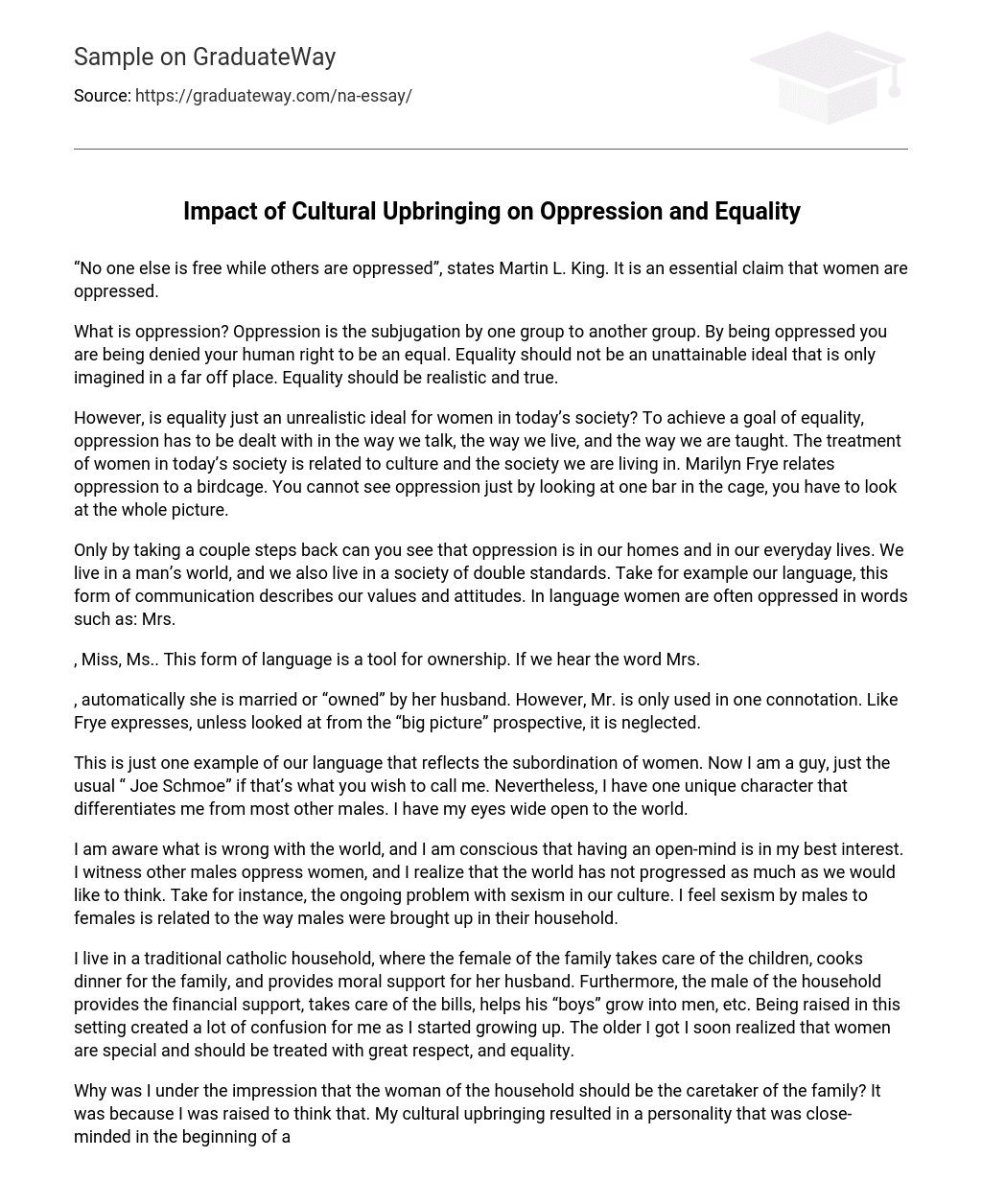Recognizing the oppression faced by women is crucial, as Martin L. King emphasized, “No one else is free while others are oppressed.”
What is oppression? It is when one group subjugates another group, denying them their basic human right to be equal. Equality should not be a distant, unachievable concept. It should be a tangible and genuine reality.
Is equality an unachievable goal for women in today’s society? To pursue equality, we must confront and address oppression in our language, lifestyle, and education. The treatment of women at present is influenced by the culture and society we live in. Marilyn Frye uses a birdcage metaphor to depict oppression. Identifying oppression entails comprehending the entirety of the framework, rather than focusing on individual bars within the cage.
Oppression is present both in our homes and daily lives, but its realization only comes when we take a moment to observe. We live in a society that is predominantly controlled by men, where double standards are prominent. One major illustration of this oppression lies within our language – a reflection of our beliefs and perspectives. Women often experience this through terms such as “Mrs.”
, Miss, Ms., and Mrs. are different forms of language used to indicate ownership.
Upon marriage, a woman is immediately regarded as the possession of her husband. Nonetheless, the term “Mr.” has a singular usage. Frye highlights that unless we adopt a wider outlook, this aspect tends to go unnoticed.
This is one instance illustrating the way our language mirrors the subordinate position of women. Despite being a male, an ordinary “Joe Schmoe” if you will, I possess a unique attribute that distinguishes me from many other men – a heightened consciousness of my surroundings.
I am aware of the societal issues and recognize the benefits of maintaining an open mind. It is evident that men suppressing women emphasizes that the progress we envision in society may not be as substantial as anticipated. A notable instance illustrating this concern is the ongoing issue of sexism prevalent in our culture. I firmly believe that men’s discriminatory treatment towards women is influenced by their upbringing within their respective households.
Initially, I grew up in a conventional Catholic household with clearly defined gender roles. Women had the expectations of taking care of children, cooking, and providing moral support for their husbands. In contrast, men were responsible for financially supporting the family, managing household expenses, and guiding their sons as they transitioned into adulthood. However, as I became older, my viewpoint changed to acknowledge the significance of respecting and offering women equal opportunities.
While my cultural background instructs me that women should be the primary caregivers within the family, Sherry Ortner argues that women’s subordinate role in society is a universal and cross-cultural fact. However, she also highlights that the treatment of women and their level of influence differ across various cultures.
Ortner argues that women experience oppression universally, but I hold a different viewpoint. Although it is undeniable that numerous cultures have historically subjected women to specific forms of oppression, we must refrain from generalizing this phenomenon across all cultures. Regrettably, certain rural cultures continue to venerate women to the extent of deifying them.
Although I empathize with Ortner’s essays, I admit that I do not completely grasp her sense of hopelessness. In my view, only those who have personally suffered from oppression can truly comprehend the anguish and difficulties faced by women. Nevertheless, it is important to acknowledge the positive transformations brought about by women despite their oppressive circumstances, such as the feminist movement.
The feminist movement has brought about positive changes for women today. My evaluation of this movement stems from a sense of anger towards the mistreatment of women. However, I believe that channeling this anger productively is possible. This can be seen through various initiatives such as women’s studies courses, feminist rallies, self-protection classes, and others.
These examples illustrate the growing awareness of the movement and the challenges it faces due to opposition against women’s increased independence in modern society. Audrey Lorde asserts that individuals who are privileged, particularly white, middle-class males, lack awareness of oppression and struggle to acknowledge its existence. As a result, men today continue to mistakenly view feminists as hostile towards them.
Despite the uncertain imposition of economic progress for women, there is still significant work to be done from a feminist standpoint. It is crucial to highlight that women continue to face oppression, although the degree to which it has diminished remains uncertain. The subjugation and inferior treatment of women have been universally acknowledged. The journey towards societal change can be uncomfortable.
Working together as a cohesive unit enables us to fight the struggle and achieve our goals. Change is the key to bringing results for all women.





